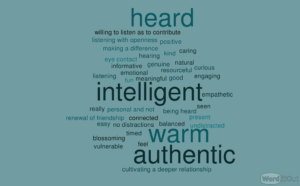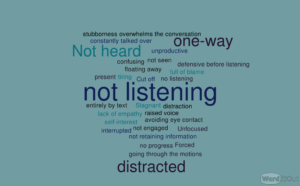In June 2020, we invited Patti DeNucci to join us for a WCA@Lunch Zoom meeting focused on “Leading Authentic, Successful Conversations During the ‘Current Normal.’”
‘Current Normal.’”
While technology keeps us connected, so many of us miss the regular face-to-face communication and conversations we enjoyed before mid-March of this year. Having authentic conversations is as challenging as it’s ever been—something we were already feeling in June.
This was our first monthly meeting of the new board term, and we were all getting used to the idea that the quarantine would continue through (at least) the summer. Same as today, we all felt like we were communicating more than ever, and the days were longer.
Patti’s interactive session focused on connecting at a higher level. Our attendees shared that meaningful conversations look and feel like this:
And when a disappointing conversation takes place, then it looks and feels like this:
Not listening stands out the most in the second word cloud, and Patti shared that our perception in a conversation is that we’re listening 60% or more, even though that’s not usually the case..
TIP: Approach a conversation as a form of generosity and you will both get more out of it.
Our interactive conversation continued and we walked away with these takeaways:
- Prepare for social meetings. Take time to think about what you want out of the conversation and event. Do you have a theme? What questions do you want to have answered? You can be the one that starts a fascinating conversation.
One attendee commented that she comes prepared for online interactions like you would a meeting with a client.
2. Approach a conversation with positivity. Lead a conversation with something that will pull the positive out of people. Tim Sanders asks, “What’s the good word?” It requires the responder to say something positive and starts the conversation on a good note. Other questions could include:
- What are you working on right now that is lighting you up?
- What are you looking forward to this week?
- What great thing happened to you today, this week, recently?
Your conversation partner may not respond with complete positivity, but you are setting the stage you want for your time with that person.
- When people overshare, then you can sidestep the conversation and not drain your own energy. When people are oversharing, acknowledge or validate, and then change the subject. Create and stick to your boundaries. Be kind. Acknowledge.
It looks like this:
- “Wow, that sounds difficult,” …and then change the subject.
- “This sounds hard, but I don’t know if now is the right time (or maybe this isn’t the right place) to discuss this.”
- “I hear what you’re saying. I know this is difficult. I hope you can get the help you need.” You can continue with, “I’m not equipped for this conversation,” if needed.
One of our attendees shared Captain Awkward as a resource to find scripts for this kind of situation (and just general good advice).
- Introverts are needed in conversation. So are extroverts.
Our online Zoom poll showed the makeup of introverts, extroverts and ambiverts in the session. According to Patti, introverts bring something special to any conversation. They can help you calm down, and find a thoughtful place. Extroverts bring energy and liveliness, but she shared that extroverts need to be careful not to overwhelm the conversation. This can happen more easily in a virtual space. For ambiverts, pay attention to where you are day by day, conversation by conversation.
We are working hard to make our virtual programming reflect our in-person programming as much as possible. Check out all of our upcoming events and join us for the next Careers Over Coffee, Leader Lunch or WCA@Lunch. See you soon!
- In Memoriam: Pam Baggett-Wallis - February 5, 2024
- Anne Lasseigne Tiedt, APR - January 6, 2024
- Cindy Friedman - December 6, 2023



